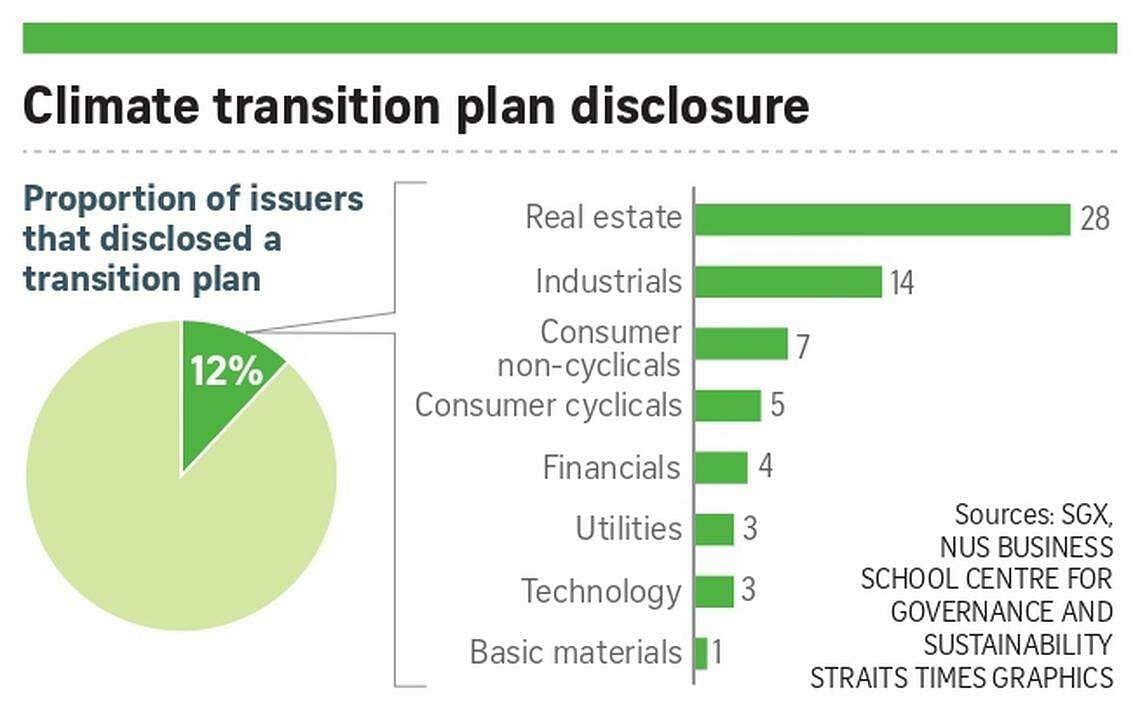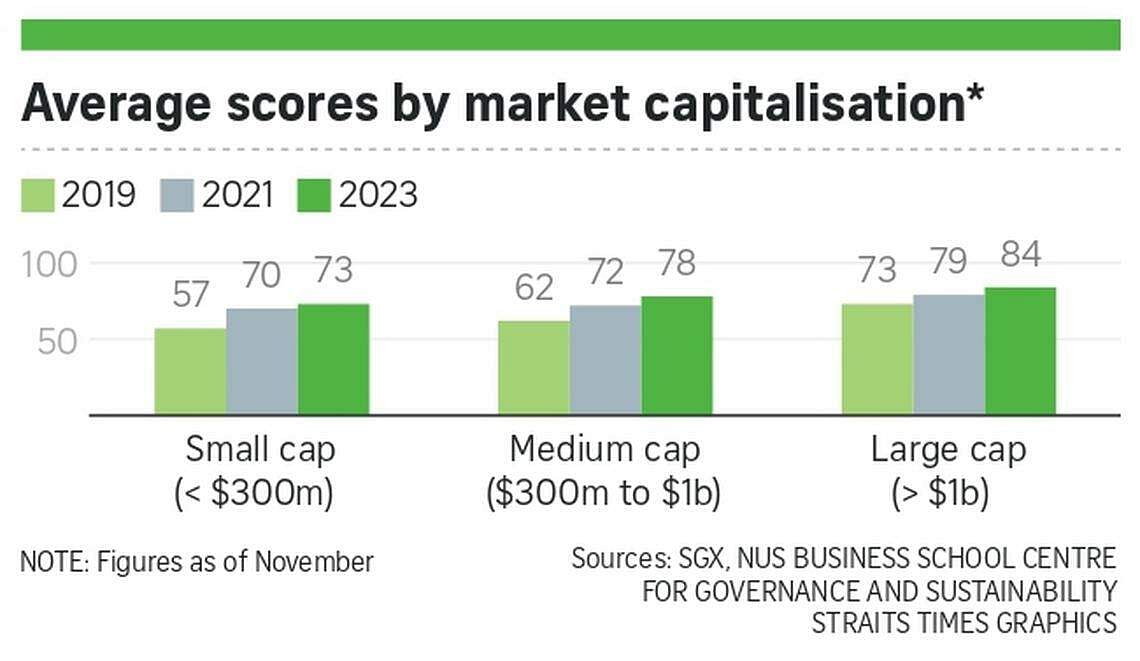SINGAPORE - Listed companies have improved in their sustainability reporting, but climate-related disclosures – including climate transition plans – were lacking, according to a biennial study.
Conducted by the Singapore Exchange Regulation (SGX RegCo) and the Centre for Governance and Sustainability at the National University of Singapore Business School, the study found that companies need to do more in assessing and managing climate-related risks and opportunities, setting realistic targets and providing a road map to those targets.
The average score in 2023 for sustainability reporting rose to 75 out of a possible 100, up from 72 in 2021 and 61 in 2019 since the first study was conducted. Companies are scored on categories such as sustainability reporting framework and targets.
But when climate-related disclosures were included in the scorecard, with a heavier weightage than the other categories, companies’ scores dropped.
Out of the 535 SGX-listed firms that published sustainability reports, 73 per cent provided climate-related disclosures, according to the Task Force on Climate-related Financial Disclosures (TCFD) framework.
The report, which was released on Nov 23, also found that just 12 per cent, or 65 firms, produced reasonably detailed climate transition plans, with those in the real estate sector leading the way.
These transition plans ranged from modest efforts to cut carbon emissions, and water and energy consumption within the companies, to bigger plans to drive change along the supply chain.
“There were cases where issuers pledged to transition to a lower carbon economy through reducing emissions in the medium term without discussing the board’s and management’s roles and responsibilities in the transition plan,” the report said.
Companies also needed to improve by explaining how they would track their progress towards the targets they set, the report added.
“The findings... are a reality check,” said SGX RegCo chief executive Tan Boon Gin.
“While companies are generally competent in sustainability reporting, the quality of climate disclosures was more uneven. This is to be expected given the speed at which new requirements were introduced.
“But we do not have the luxury of time. We hope this report will help companies to close the gap between their current state and what is expected of their green credentials.”
Climate-related disclosures are mandatory for listed companies in the financial, food and forest products and energy sectors from the 2023 financial year, and will extend to listed firms in materials and buildings, and transportation industries from 2024. All other listed companies need to apply the TCFD recommendations or explain why they are not doing so.


Professor Lawrence Loh, director for the Centre for Governance and Sustainability, said there has been a positive trend in sustainability reporting, but the introduction of climate-related disclosures has shown that companies, particularly small issuers, need significant development in that area.
“As the global landscape continues to emphasise sustainability, we hope that our findings will inspire companies to re-evaluate and enhance their existing practices. By taking proactive measures, we believe we can take one step closer to fulfilling the Government’s commitment in achieving net-zero emissions.”
He said in his presentation of the results that there was a size effect among the companies, as firms with a market capitalisation of under $300 million saw a larger drop in scores when climate-related disclosures were taken into account.
“I think the main reason is that sometimes sustainability is resource-intensive.
“We need certain capabilities not just in skills and mindset, but more importantly, in capacity such as resources, structures, board accountability, board involvement – these are things that usually come up in companies with large market capitalisation.”
Interestingly, there was also a drop in the number of companies that linked top executive remuneration to sustainability performance, which might be because companies shifted focus to non-sustainability issues when the going got tough, Prof Loh said.
“Informal feedback said that the main worry for companies is something broader – for one thing, macroeconomic conditions including inflation, interest rates, and secondly, geopolitical conditions including the tension between the two top economic powers, the crisis in Europe, and not for this review, the Middle East.
“These are things that often come in to distract (from) sustainability... Many companies that I speak to, when they have to cut the budget, the first thing they do is cut the sustainability budget, which is not right.”
Deputy Prime Minister Heng Swee Keat said at the report’s launch that sustainability has become an increasingly salient pillar of good corporate governance and that sustainability reporting can be a catalyst for business transformation.
“Corporate leaders should see sustainability reporting as a means of sharpening your competitive edge.
“Effective sustainability reporting is critical in demonstrating the resilience of business plans and how companies are positioning themselves to capture opportunities from the climate transition.”
Sustainability reporting can also serve as a springboard for innovation, as tracking targets and metrics can guide companies in developing the latest technologies to make their business more sustainable.
Highlighting how sustainability reporting helps firms to attract and retain talent, Mr Heng said: “Today, more workers, especially the younger ones, are attracted to companies that take sustainability seriously.”
He added that the Government will publish an annual report tracking the public sector’s efforts, progress and plans in rolling out sustainability initiatives for the 2023 financial year.
All statutory boards will also be required to publish annual sustainability disclosures from the 2024 financial year.


